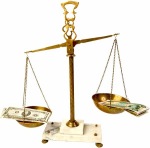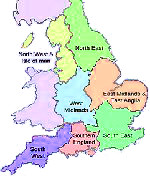The Press are to Blame for Nick Clegg's Rise and Fall

Before the election he was perhaps the most popular man in politics - even other politicians were clambering over each other to agree with him. Or so the press would have us believe, anyway. Actually, while some newspapers were singing his praises, others were mocking him. Arguably the latter sections of the press were those that might be seen as part of the establishment, and their mockery acted as reverse-psychology support for his anti-establishment positioning. I may be over-thinking that, but probably not.
I'd guess Clegg's support came from two main groups. Firstly, political tacticians who probably wanted to see Labour removed from power, but didn't trust the Conservatives to rule by themselves and thus wanted a coalition government. The second group of supporters were probably a little less politically astute and supported him because of the policies he said he wanted to bring in.
Many of Clegg's policies were extremely populist, but perhaps rather unrealistic. The biggest clue was probably his opposition to Trident. On the face of it, it might sound like a brilliant idea - the US are our allies and they have plenty of nukes, let them take up any slack while we save money. Or, you could take the compelling view that nuclear weapons are just downright evil and wrong, and we should set a good example to the world by reducing our ability to project death across the globe in the hope that others will see the light and be nice to us.
It would be nice if the latter argument was true. If the world's dictators were sane, kind and reasonable, and democratic states were made up of voters who were well-informed and logical, then it might just work. The evidence of history and current affairs suggests this is not the case. Even if I'm wrong about this, there are probably deep-rooted political reasons why it doesn't matter one way or the other.
Even if none of our missiles were ever fired, (and let's hope they're not), the knowledge that a British submarine could be lurking undetected off a hostile coast, with the power to obliterate a country, gives real political power. It promotes peace and compromise with enemies, and it probably gives political favours with allies. On the reverse side, the Americans would probably have not been very pleased had the British pulled out of the agreement (and may have punished us in some invisible economic or political way), because it's a source of revenue to US businesses and the completed fleet will probably be used in future as part of the US' efforts to project their political and military might across the globe, which I'd guess usually benefits both countries.
So scrapping Trident was probably always unlikely, and presumably it always looked unlikely to anyone who considered the above arguments.
Nick Clegg wanted to be elected and to get elected a politician must get votes. To get votes, a politician must promise things that people want. It appears, given his support, that there was a bunch of voters who wanted things that were actually unrealistic. Of course I'll make no judgement on Clegg's thinking. Either he lied to get votes, or he himself had unrealistic ideas about what he could achieve, or my reasoning is wrong. That's not for me to decide. The point is, given the situation he found himself in as the leader of the third party, even if he had the very best of intentions, he would be forced to promise unrealistic things in order to carry out those good intentions.
Where there are a large number of people who want something, a politician who wants to be elected should promise those things. If half the population demanded that our national water supply be replaced by custard, a politician should promise to do just that - that's how they get elected, and they are there to serve the public. Once in power, they'd probably wait a while before announcing sadly, that after consulting with experts from the national water grid and health experts, that the plan was unworkable at the moment because the pipes couldn't take the pressure, and cutting off free water might actually kill people who couldn't afford to buy bottled water, and so on. Of course it would also be the previous government's fault for not having the foresight to upgrade the national grid to carry both water and custard.
Ultimately, the problem here is not so much that our theoretical politician promised free custard and then cynically U-turned on his solemn promise to the electorate, but that half the country couldn't see how impractical it was to force custard through water pipes and didn't think it through. But that's not their fault.
This is where the media's responsibility come into play. If it became obvious that the national custard grid had taken hold in the popular imagination, why didn't they start running unbiased articles on the subject? An unbiased article would explicitly spell out the reasons why such an idea was not workable and provide the evidence that proved it. The only reasonable explanations are that either they didn't take it seriously, or they thought it was a good idea themselves, or were somehow unaware of the custard movement, or that they were somehow hamstrung in talking about it. The alternative is that they were well aware of both the popularity of the idea and how impractical it was, but were prepared to see a politician elected on a custard platform, for reasons known only to them.
One thing is very clear. If the press want an informed electorate and politicians who don't have to be hypocrites in order to do their job, then the members of the press had better start doing their own jobs better.
Photograph taken from the wikipedia entry for Nick Clegg, photographer: David Spender.



